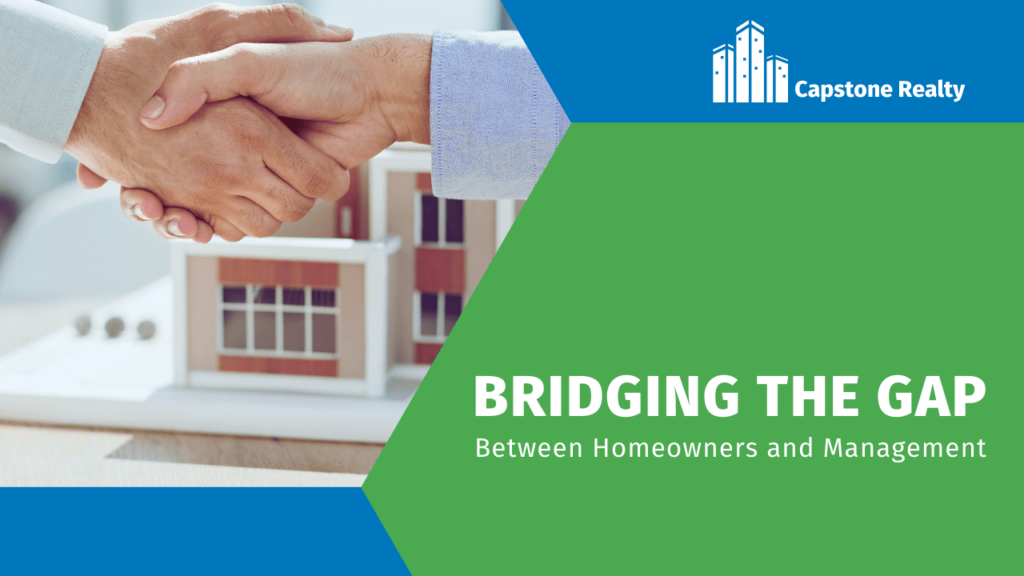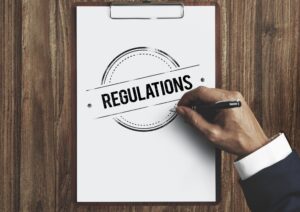
A sense of disconnect is never good for any relationship. It’s especially not good for an HOA community.
Unfortunately, there’s often a large gap between what homeowners believe to be true and what HOA board members and management believe to be true.
Clear and consistent communication is essential to ensure that everyone is on the same page and working towards the same goals. When homeowners feel like decisions are being made without input, they’re likely to push back. When the HOA board feels like homeowners don’t care about or appreciate their leadership, they’re likely to leave those homeowners in the dark.
We’re talking today about how a Winston-Salem HOA management company can be especially useful in bridging that gap which may exist between the homeowners in your community and the board of directors that’s volunteering their time and expertise to make the community a better place.
Let’s look at some of the most common issues, potential solutions, and the role that a Winston-Salem HOA management company can play in liaising between board members and homeowners.
Communicating with Homeowners Before they Buy in an HOA
 Often, there is a gap in expectations when a new homeowner buys in an association, especially if they’ve never lived in an HOA before. We recommend an orientation plan for new members of the community. Even before they join your neighborhood, give prospective buyers some tips on what it’s like to be part of your HOA.
Often, there is a gap in expectations when a new homeowner buys in an association, especially if they’ve never lived in an HOA before. We recommend an orientation plan for new members of the community. Even before they join your neighborhood, give prospective buyers some tips on what it’s like to be part of your HOA.
Whether your homes are in a gated community or a condominium complex, consider these ways to help new members acclimate to your HOA.
Q & A Time: Do They Know That Joining the Association is Mandatory?
You’d be surprised at how many people don’t realize that buying a home in an HOA means immediate membership in the association. There’s no choice to join or not join, and it would behoove any association to make this clear before a buyer closes the deal. Buying a home in a planned community means the homeowner is automatically a member of the community. Dues must be paid and rules and regulations must be complied with.
Speaking of rules and regulations…this is where the most disconnect occurs between homeowners and HOAs. If there’s going to be a gap in communication, understanding, and cooperation, it’s like due to a rule or a rule violation.
Compliance with Association Rules and Regulations
The rules and regulations span many different areas. Common ones include:
| Color themes
Homeowners need to understand that they can only paint shutters and doors and homes and even mailboxes in certain colors. |
Pets
Pet size and number of pets are often regulated by HOAs. Make sure this information is clear to all potential buyers. |
| Trash Can Positioning
Do your new and future homeowners understand when trash cans can be put out and where they should go? |
Parking
Most communities won’t allow RVs and boats to be parked at a homeowner’s properties. There may be rules around street parking that need to be communicated as well. |
Provide a copy of the Covenants, Conditions, and Restrictions (CC&Rs) before someone buys in your HOA. Provide the bylaws, too, and any other governing documents.
Communicating about Rules and Regulations with Existing Homeowners
 Most HOA communities are famous for having long lists of rules and regulations that residents and homeowners must follow.
Most HOA communities are famous for having long lists of rules and regulations that residents and homeowners must follow.
Your existing residents should know them, but you should still not be afraid to over-communicate about them. This can bridge any gaps in understanding and compliance.
Are rentals allowed? What about Airbnbs? Consistently update your policies, and make sure they’re transparent. Provide your homeowners to make their recommendations and provide their input.
- How to Handle Violations
The HOA needs to hold homeowners accountable for any violations of these rules. This may include paying fees, solving problems, and coming into compliance. If there are always violation notices going to the same homeowners for the same reasons – weeds or overgrown bushes, for example, consider offering solutions such as a landscaper. If you send a lot of notices for cars illegally parked or dog messes not being cleaned up, you’ll have to address these issues with your homeowners and make sure the fees are paid. Again – communicate around these issues as much as you can so you bridge that gap between your homeowners and your board.
- Environmental Practices and Restrictions
More and more HOAs are coming up with policies around fertilizers and pesticides near the homes within communities. Discuss this with homeowners. Decide on some policies. Are gardens permitted? Are there restrictions on what’s planted? Talk about trash and sewage and organic composting.
Association Fees and Dues
 It’s important that your homeowners understand the HOA fee structure. They are typically charged annually, quarterly, or monthly. Share the history and purpose of the fees, how often they have been increased over the years, and what they cover. Provide ongoing dialogue around how special assessments work and what they pay for. These costs will impact your homeowners and your HOA financially. Some fees are just $100 a year and others are thousands of dollars a year. You don’t want any surprises.
It’s important that your homeowners understand the HOA fee structure. They are typically charged annually, quarterly, or monthly. Share the history and purpose of the fees, how often they have been increased over the years, and what they cover. Provide ongoing dialogue around how special assessments work and what they pay for. These costs will impact your homeowners and your HOA financially. Some fees are just $100 a year and others are thousands of dollars a year. You don’t want any surprises.
Be willing to provide past minutes from previous board meetings. This will give homeowners insight into how the board handles maintenance, and what kinds of projects have been completed and are coming up. Make sure your homeowners understand that the community needs a solid reserve fund and not too many delinquent accounts.
HOA dues will pay for things like security, exterior maintenance, landscaping, amenities, and sometimes it also includes monthly bills like cable television, trash, and water. The amount your homeowners pay will vary, depending on your community.
They have to know what to expect.
Remind your homeowners of the consequences, too. Unpaid HOA dues can lead to foreclosure and large penalties.
Helping Homeowners Understand the Role of an HOA Board

One of the things we do particularly well as a Winston-Salem HOA management company is work with homeowners to understand the role of the board and the essential service that they are providing. Because a lot of times, the gap between homeowners and HOA board members is simply that they don’t know why they’re in place and what they’re doing.
Every community association in Winston-Salem will have a Board of Directors, which is composed of homeowners within the community who are elected by their fellow homeowners. These board members are volunteers who execute a number of tasks that homeowners do not always know about. The work of the HOA board affects every resident in the association, and so it’s important to make sure your association membership understands all of the work that boards do on behalf of their communities.
Share the following with your homeowners in some way. Let them know that you are responsible for these things as a board:
| Enforcing and Creating Community Association Rules in Winston-Salem
Would your homeowners know that one of the most important tasks of a Winston-Salem association board is to create and enforce the association’s rules? Probably. This, in fact, is what HOA board members are especially known for. Not all residents appreciate being told what they can and can’t do at their own property. However, it’s your job to explain that the board creates these rules because they want to protect the greater good. No one will like every rule that is implemented. However, working with a reliable set of requirements and responsibilities can help the entire association work and live together easily. By enforcing all association rules, the board keeps property values up while keeping conflicts to a minimum. Homeowners should know that most community association boards will do whatever is good for the majority of homeowners. |
Collecting Assessments as a Winston-Salem HOA Board
Assessments need to be communicated as necessary and positive in order to bridge any gap that leads your association members to believe it’s simply a money grab. Collecting assessments from homeowners is an important responsibility of the HOA board. These assessments contribute to the stability and effectiveness of the association. They are usually spent on all of the common elements and amenities enjoyed by every resident. Usually, the assessments include paying for landscaping, pools, the clubhouse, ponds, lakes, roads, and sidewalks. When boards collect these assessments from homeowners, they can replenish the reserve funds that the association needs. There may be major repairs that are currently needed or perhaps the board is planning and budgeting for repair needs and projects down the road. |
| HOA Boards Hire and Negotiate with Vendors
Someone has to clean the community pool and keep up with the security if your neighborhood is gated. The board has the authority to act on behalf of the association to hire property managers and other professionals such as attorneys, contractors, accountants, and anyone who will help a community grow stronger and more stable. Homeowners need to understand the time it takes to consider, lead, and implement projects that will benefit the community and improve quality of life. It’s a big job and largely uncelebrated, but most of the board members we meet are happy to work on behalf of homeowners and make the community a great place to call home. |
Governance and Oversight
Administrative work is seen by a lot of people as pretty boring, so it’s important to inspire some appreciation among homeowners for what the board does on a day-to-day basis. Most HOA board members are volunteers, and it’s a role that can be both challenging and rewarding. It is almost always time-consuming. One of the most important roles of a board is to provide governance and oversight for the entire community. This oversight is necessary in order to protect your community and ensure everyone is treated fairly and consistently. |
| HOA Board Meeting Management
Board meetings are another major responsibility for any elected board members. The association board is required to meet regularly, and the exact number of meetings held per year can be found in the bylaws. Homeowners in the community have a right to attend or participate in these board meetings, and they must be open and accessible. This is a great way to keep everyone connected and on the same page. A good board meeting will have an agenda and action items. Each elected official and committee chairperson should give a report, and any outstanding issues should be addressed and discussed. The meeting minutes are a matter of official record. Make sure they are accurate, transparent, and kept on file in case any residents want to see them. |
Budgeting and Financial Oversight
Winston-Salem HOA boards are known to be responsible for planning budgets and collecting association dues. Introduce homeowners to the different officers on the board. The treasurer will have most of the oversight in these financial matters, and your homeowners should know who that person is. Everything must be documented and audited on a regular basis. Every HOA has several different accounts, including an operating account and a reserve account. The HOA board is expected to pay routine bills and plan for capital improvements, assessments, and other long-term or major expenses. |
Encourage Homeowners to Work with Their HOA: Board Volunteers are Always Needed
 Things can get pretty tricky when no one volunteers for the board of directors within an HOA.
Things can get pretty tricky when no one volunteers for the board of directors within an HOA.
When absolutely no one wants to serve on the board, it’s possible that the courts could get involved and have a Receiver take over the community. The Receiver would hire a paid board to manage the affairs of the community.
This is not what any association wants, and so it’s important to drive engagement within the community. Any homeowner should be invited into a volunteer or officer role within the HOA board.
How an HOA Management Company Can Bridge Gaps Between Homeowners and the HOA

As HOA managers in Winston-Salem, we have a lot of experience working with HOAs who need support dealing with homeowners and the day-to-day activities of their communities. We understand the time requirements and hassles that volunteer boards have to deal with, and we know that professional help can make a difference when it comes to running things more efficiently.
Professional HOA management works in communities of all sizes. If you’ve never considered professional property management for your Winston-Salem HOA, consider the benefits that are available. One of the most important benefits is that we act as a bridge between the HOA leadership and the HOA members.
What to Expect with Professional Homeowner Association Management
Good homeowner association management includes accounting and financial services that are detailed, accurate, and transparent. You also want a property manager who can communicate with both the board and the homeowners.
You need a qualified and experienced team of professionals who can collect and account for dues, manage violations, and keep the community running according to the goals and priorities of the association.
A good HOA property manager can focus on your association and its unique needs. This could include managing board meetings, supervising vendors and maintenance staff, and welcoming new residents into the community.
Here’s what a company like ours does for an HOA like yours:
| Communication with Board and Homeowners
All successful relationships begin with communication. Communication is essential to the effective management of your homeowner association, and property managers can facilitate that. Board members are also homeowners, and no one wants to collect overdue assessments or issue fines on their neighbors. A professional association management company can help. Your property management partners will take the lead on responding to homeowner calls, complaints, and questions. We’ll share information and education that keeps everyone on the same page. We’ll communicate responsibilities, regulations, and expectations. Think of your professional Winston-Salem property management company as your liaison ready to communicate responsively and proactively with vendors, board members, homeowners, and community partners. |
| Technology and Best Practices for Homeowner Associations
Have you thought about using technology to bridge the gap between homeowners and management? It can be useful. A website. Private social media groups. All of these are good ways to develop a sense of community. Accessing an online portal is easy for boards, homeowners, and the entire association. Property managers will provide a platform that’s easy to use, transparent, and safe. With this technology, your HOA board is in control of viewing financial information and using that data to make smart decisions. A good property management company will document and keep track of your association’s bylaws, regulations, and other governing documents. You should always be able to see financial statements. All of this can be on a portal or platform that can be easily accessed by homeowners and board members. |
| Reporting Homeowner Association Income and Expenses
Even if you feel like your board already has the experience and the tools to manage the accounting and the budgeting, it might help to have a team of property managers who are effectively collecting dues and assessments, charging fines and fees, and paying the bills for things like maintenance, security, and pool care. A management company’s sophisticated accounting software will provide detailed and accurate financial reporting and statements. We protect you from fraud and implement standard accounting principles that protect you and your HOA’s funds. |
Let’s talk about how we can help hold your HOA board a little bit closer to your association homeowners. Contact us at Capstone Realty Consultants for all of your Winston-Salem HOA management needs.
